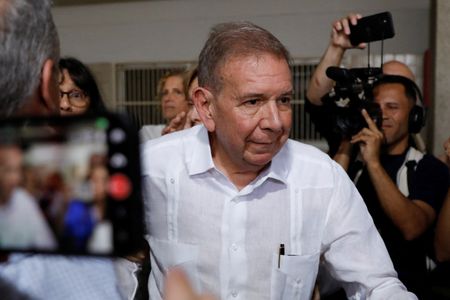By Lisandra Paraguassu
BRASILIA/CARACAS (Reuters) -Brazil’s top foreign policy adviser on Tuesday slammed Venezuela’s arrest warrant for opposition leader Edmundo Gonzalez as “very concerning” and said there was a clear “authoritarian escalation” in the country.
Other countries around the Americas, including the United States, Argentina and Peru, also condemned the move.
The Venezuelan attorney general’s office said on Monday that a court had issued an arrest warrant for Gonzalez, the opposition’s erstwhile presidential candidate, accusing him of conspiracy and other crimes amid a dispute over whether he or President Nicolas Maduro won the July 28 election.
Brazilian foreign policy adviser Celso Amorim said in an interview with Reuters that if Venezuelan authorities do go through with Gonzalez’s arrest, “It would be a political arrest, and we do not accept (there should be) political prisoners.
“There is no denying that there is an authoritarian escalation in Venezuela. We do not feel openness to dialogue, there is a very strong reaction to any comment,” Amorim said, while adding that Brazil still held out hope for a solution to the crisis.
Later, the Brazilian and Colombian governments in a joint statement said they were profoundly concerned about the issue of the arrest warrant.
Washington also criticized the warrant, which followed weeks of comments from Venezuelan government officials that Gonzalez and other members of the opposition should be jailed.
“This is just another example of Mr. Maduro’s efforts to maintain power by force and to refuse to recognize that Mr. Gonzalez won the most votes on the 28th of July,” White House national security spokesman John Kirby told reporters.
“We’re considering a range of options to demonstrate to Mr. Maduro and his representatives that their actions in Venezuela will have consequences,” Kirby said.
A statement is expected from Gonzalez later on Tuesday.
“He has not requested asylum, he has not requested to be treated as a guest in any embassy,” Gonzalez’s lawyer Jose Vicente Haro told journalists outside the opposition leader’s residence in Caracas.
“He’s not at his residence in order to preserve his freedom, his security, his life and to preserve the will of the Venezuelan people,” Haro added.
Ruling party officials including Maduro have accused the opposition of stoking violence, commanding fascist groups and working at the behest of imperialist interests abroad.
Criminal probes have been launched into opposition leader Maria Corina Machado and into the opposition’s vote tally website, while several major opposition figures have been detained.
Venezuela’s national electoral authority and its top court have said Maduro was the winner of the election with just over half of the votes, but tallies shared by the opposition show a resounding victory for the opposition.
Brazil and other countries have demanded publication of full voting tallies.
(Reporting by Lisandra Paraguassu in Brasilia, Anthony Ramirez and Carlos Ramirez in Caracas and Steve Holland in Washington; Writing by Luana Maria Benedito and Gabriel Araujo; Editing by Rosalba O’Brien and Leslie Adler)










